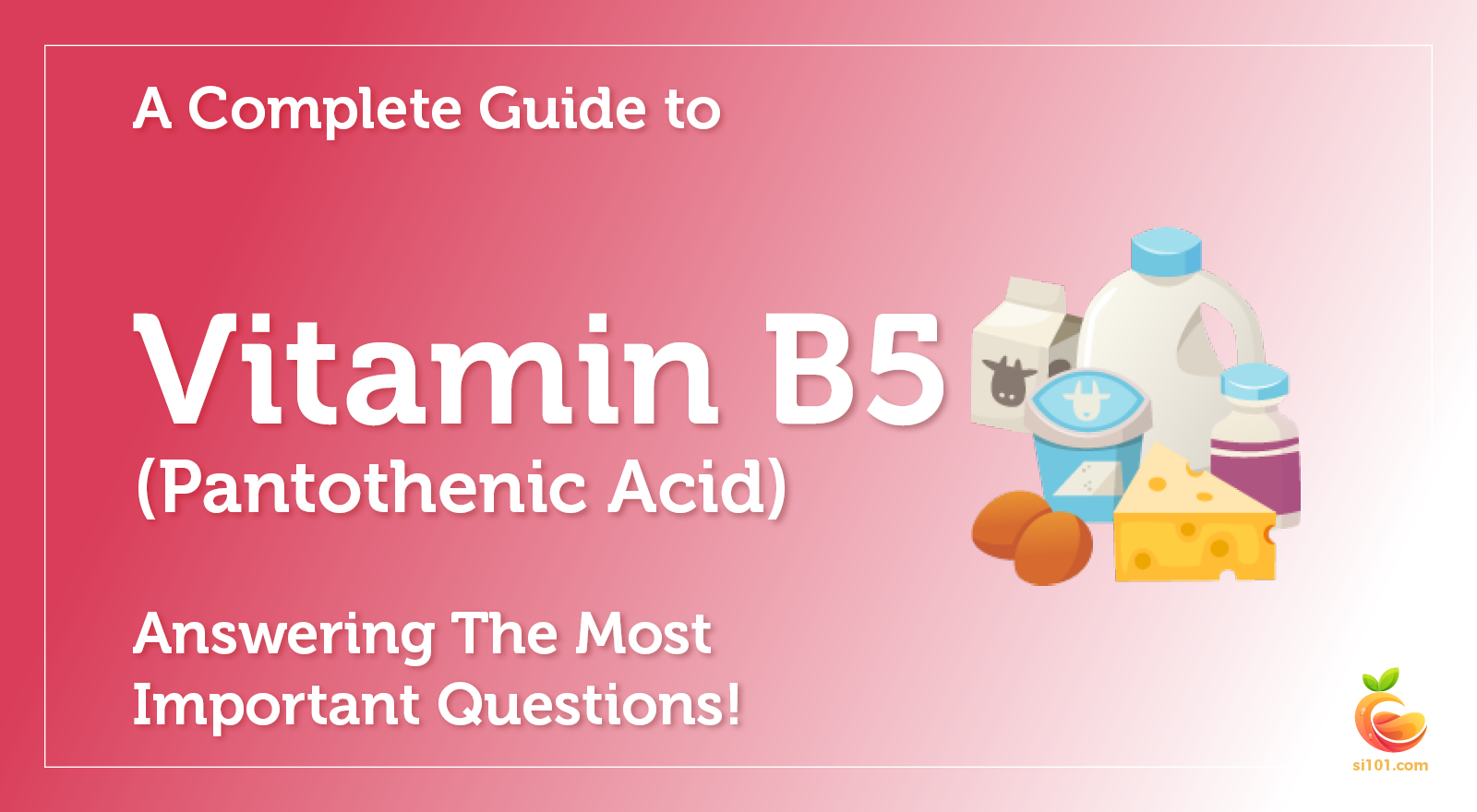Vitamin B5, also known as Pantothenic Acid, is an essential nutrient for the human body. It has many nutritional and health benefits, including aiding in energy production, hormone synthesis, and healthy skin. A deficiency of Vitamin B5 can cause a variety of symptoms such as fatigue, nausea, insomnia, and depression. Fortunately, there are many sources of Vitamin B5 available in food and supplements. Foods high in Vitamin B5 include eggs, legumes, mushrooms, sweet potatoes and avocados. Supplements are also available to help meet your daily requirements for this important vitamin. The recommended dosage varies depending on age and other factors but is generally between 5-7mg per day for adults. This comprehensive guide will provide you with everything you need to know about Vitamin B5 so that you can make informed decisions about how to get enough of this important nutrient into your diet!
What are the health benefits of vitamin B5?
Vitamin B5, also known as pantothenic acid, is an essential nutrient that plays a vital role in many of the body’s metabolic processes. It helps to convert food into energy and is necessary for healthy skin, hair, eyes, and liver. Additionally, vitamin B5 helps to maintain normal growth and development. As such, it’s important to ensure you get enough of this important vitamin through your diet or supplementation.
When it comes to nutritional benefits, vitamin B5 has been linked with improved cognitive performance and memory retention. It can also help reduce fatigue and stress levels by increasing the production of serotonin in the brain. Furthermore, research suggests that supplementing with vitamin B5 may improve symptoms associated with certain skin conditions such as acne vulgaris.
In terms of health benefits, vitamin B5 is thought to have antioxidant properties which can help protect against oxidative damage caused by free radicals. Additionally, it may be beneficial for reducing cholesterol levels and improving heart health. Deficiency symptoms include fatigue, nausea, vomiting and abdominal pain however these are rare due to the abundance of dietary sources available for this nutrient.
Good sources of Vitamin B5 include eggs, fish (such as salmon), dairy products (like milk), legumes (beans) whole grains (oats) nuts (almonds) mushrooms (shiitake) fruits (avocados). Supplements are also available if needed but should only be taken under medical supervision due to potential side effects when taken in high doses over long periods of time. The recommended daily dosage for adults is 5mg per day however pregnant women should consult their doctor before taking any supplements as higher dosages may be required during pregnancy or breastfeeding stages.
What is the recommended dosage of vitamin B5?
Vitamin B5, also known as pantothenic acid, is an essential nutrient that helps the body convert food into energy. It has many nutritional and health benefits, including improved digestion, better skin health, and increased energy levels. A deficiency in vitamin B5 can lead to fatigue, depression, and other symptoms. Fortunately, there are a variety of sources of vitamin B5 available for those who need it.
Foods high in vitamin B5 include whole grains such as wheat germ and oats legumes such as lentils and chickpeas nuts like almonds and cashews eggs dairy products like milk and yogurt meats like beef liver fruits such as avocados and oranges vegetables like broccoli and sweet potatoes mushrooms fish such as salmon or tuna fortified cereals brewer’s yeast royal jelly from honeybees. Supplements are also available for those who cannot get enough vitamin B5 from their diet alone.
When it comes to dosage recommendations for vitamin B5, the recommended daily allowance (RDA) is 5 mg per day for adults over 19 years old. However, if you have certain medical conditions or take certain medications that affect your absorption of this nutrient, your doctor may recommend a higher dose. It is important to talk to your doctor before taking any supplements so that you can determine the right dosage for you based on your individual needs.
What are the functions of vitamin B5 in the body?
Vitamin B5, also known as pantothenic acid, is an essential nutrient that plays a key role in many bodily functions. It helps to break down carbohydrates, proteins and fats into energy and is involved in the production of hormones and cholesterol. Vitamin B5 is also important for healthy skin, hair, eyes and liver function.
The body needs vitamin B5 to stay healthy. A deficiency can lead to fatigue, insomnia, depression and other health problems. To ensure adequate intake of this important nutrient it’s important to include foods high in vitamin B5 in your diet or take supplements if necessary. Foods such as eggs, dairy products, legumes, mushrooms and avocados are all good sources of vitamin B5.
When it comes to supplementation for vitamin B5 there are no specific dosage recommendations since everyone’s needs vary depending on age and overall health status. However most experts recommend between 5-7 mg per day for adults over 19 years old while pregnant women should aim for 7-10 mg daily. Taking too much can cause side effects such as nausea or diarrhea so it’s best to consult with your doctor before taking any supplement.
In conclusion, vitamin B5 plays an important role in many bodily functions including energy production and hormone synthesis which makes it essential for overall health. To ensure adequate intake make sure you include plenty of foods high in vitamin B5 like eggs, dairy products and legumes in your diet or consider taking a supplement if needed but always check with your doctor first before doing so!
How should vitamin B5 be taken?
Vitamin B5, also known as pantothenic acid, is an essential nutrient that plays a role in many bodily functions. It has numerous nutritional and health benefits, but it can be difficult to get enough of this vitamin from diet alone. Fortunately, there are several sources of Vitamin B5 and supplements available to help ensure adequate intake. In this article, we’ll discuss how to take Vitamin B5 for optimal health benefits.
First, let’s look at the nutritional benefits of Vitamin B5. This vitamin helps with energy production and metabolism by breaking down fats and carbohydrates into energy for the body to use. It also helps synthesize hormones like cortisol and aids in the formation of red blood cells. Additionally, Vitamin B5 helps support healthy skin and hair growth as well as a strong immune system.
Now that you know the nutritional benefits of Vitamin B5, let’s talk about how to get enough of it in your diet or through supplementation. Foods high in Vitamin B5 include eggs, fish, milk products, legumes such as lentils and beans, mushrooms, avocados and sweet potatoes. If you don’t eat these foods regularly or if you have a deficiency in this vitamin due to poor dietary habits or medical conditions like Crohns disease or celiac disease then taking a supplement may be necessary for optimal health benefits. The recommended daily dosage for adults is 5mg per day but it can vary depending on age and other factors so it is best to consult with your doctor before taking any supplements.
In conclusion, Vitamin B5 is an important nutrient that provides numerous health benefits including improved energy production and metabolism as well as healthier skin and hair growth plus stronger immunity against illnesses. To ensure adequate intake of this vitamin either increase your consumption of foods high in Vitamin B5 or consider taking a supplement if needed after consulting with your doctor about dosage recommendations for your individual needs
What are potential risks of consuming too much vitamin B5?
Vitamin B5, also known as pantothenic acid, is an essential nutrient that plays a role in many bodily functions. It has numerous nutritional and health benefits, but consuming too much of it can lead to potential risks. Here we will discuss the potential risks of consuming too much vitamin B5.
One potential risk of consuming too much vitamin B5 is developing a deficiency in other vitamins and minerals. Vitamin B5 helps to regulate the absorption of other vitamins and minerals in the body, so if you consume more than your body needs, it could lead to deficiencies in other nutrients. Additionally, if you take large doses of vitamin B5 supplements without consulting with your doctor first, you may be at risk for overdosing on this nutrient.
Another potential risk associated with consuming too much vitamin B5 is experiencing side effects such as nausea or diarrhea. While these symptoms are usually mild and temporary, they can become severe if left untreated. Additionally, taking high doses of this nutrient over long periods of time can cause an imbalance in electrolytes which can lead to serious health problems such as kidney stones or heart arrhythmias. Therefore it’s important to consult with your doctor before taking any kind of supplement containing Vitamin B5 or increasing your dietary intake significantly above recommended levels.
In conclusion, while Vitamin B5 has many nutritional and health benefits when consumed within recommended amounts, consuming too much can lead to potential risks such as developing deficiencies in other vitamins and minerals or experiencing side effects like nausea or diarrhea. Therefore it’s important to speak with your doctor before increasing your intake significantly beyond what is recommended for healthy adults (1-2mg per day).
What are natural sources for vitamin B5?
Vitamin B5, also known as pantothenic acid, is an essential nutrient that helps the body convert food into energy. Its found in a variety of foods and can be taken as a supplement. This vitamin plays an important role in many bodily functions, including metabolism, hormone production, and immune system health. Getting enough Vitamin B5 is important for overall health and well-being.
Nutritional benefits of Vitamin B5 include helping to break down carbohydrates, proteins, and fats for energy production aiding in the formation of red blood cells promoting healthy skin and hair supporting adrenal gland function and assisting with calcium absorption. Additionally, Vitamin B5 has been shown to help reduce stress levels by improving moods and cognitive performance.
Foods high in Vitamin B5 include beef liver, eggs, salmon, avocado, sweet potatoes, sunflower seeds, mushrooms , broccoli , cauliflower , legumes , whole grains , nuts , dairy products such as yogurt or cheese . Supplements are also available if youre not getting enough from your diet. The recommended daily dosage for adults is 5 mg per day for men and 4 mg per day for women. Deficiency symptoms may include fatigue , muscle cramps or pain , nausea or vomiting . If you think you may be deficient in this vitamin its best to speak with your doctor before taking any supplements.
Frequently Asked Questions
What are the nutritional benefits of Vitamin B
Vitamin B is an essential nutrient that helps the body to function properly. It has many benefits, including providing energy, supporting a healthy nervous system, and helping to form red blood cells. Vitamin B also helps the body to metabolize carbohydrates, fats, and proteins for energy production. Additionally, it can help reduce fatigue and stress levels, as well as improve moods. Furthermore, Vitamin B may help protect against certain diseases such as heart disease and stroke by lowering cholesterol levels.
What are the health benefits of Vitamin B
Vitamin B is an essential nutrient that can provide numerous health benefits. It helps to convert food into energy, aids in the formation of red blood cells, and supports the nervous system. Vitamin B also plays a role in maintaining healthy skin, hair, eyes, and liver. Additionally, it may help reduce the risk of certain diseases such as heart disease and stroke by lowering cholesterol levels and improving circulation. Finally, Vitamin B has been shown to boost mood and cognitive function by helping to regulate hormones such as serotonin.
What are the symptoms of Vitamin Beficiency?
Vitamin B deficiency can cause a range of symptoms, including fatigue, anemia, loss of appetite, nerve damage, and digestive issues.
What foods contain high levels of Vitamin B5?
Foods that contain high levels of Vitamin B5 include mushrooms, avocados, sweet potatoes, broccoli, and eggs.
Conclusion
Vitamin B5, also known as Pantothenic Acid, is an essential nutrient for our bodies. It has many nutritional and health benefits, including aiding in the metabolism of fats and carbohydrates, promoting healthy skin and hair growth, and helping to reduce stress levels. Deficiency symptoms include fatigue, nausea, vomiting, and abdominal pain. Foods high in Vitamin B5 include eggs, liver, broccoli, cauliflower, mushrooms and avocados. Supplements are available if dietary sources are not sufficient. The recommended daily dosage of Vitamin B5 is 5 mg per day for adults. By understanding the importance of Vitamin B5 in our diets we can ensure that we get enough to keep us healthy and functioning at our best!


